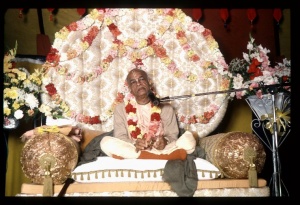SB 7.7.46: Difference between revisions
m (1 revision(s)) |
No edit summary |
||
| Line 1: | Line 1: | ||
{{info | {{info | ||
|speaker= | |speaker=Prahlāda Mahārāja | ||
|listener= | |listener=Prahlāda Mahārāja's school friends | ||
}} | }} | ||
[[Category:Srimad-Bhagavatam - Canto 07 Chapter 07]] | |||
[[Category:Bhagavatam Verses Spoken by Prahlada Maharaja - Vanisource|070746]] | |||
<div style="float:left">'''[[Srimad-Bhagavatam]] - [[SB 7|Seventh Canto]] - [[SB 7.7: What Prahlada Learned in the Womb|Chapter 7: What Prahlāda Learned in the Womb]]'''</div> | |||
<div style="float:right">[[File:Go-previous.png|link=SB 7.7.45]] '''[[SB 7.7.45]] - [[SB 7.7.47]]''' [[File:Go-next.png|link=SB 7.7.47]]</div> | |||
{{RandomImage}} | |||
==== TEXT 46 ==== | ==== TEXT 46 ==== | ||
<div | <div class="verse"> | ||
nirūpyatām iha svārthaḥ | :nirūpyatām iha svārthaḥ | ||
kiyān deha-bhṛto 'surāḥ | :kiyān deha-bhṛto 'surāḥ | ||
niṣekādiṣv avasthāsu | :niṣekādiṣv avasthāsu | ||
kliśyamānasya karmabhiḥ | :kliśyamānasya karmabhiḥ | ||
</div> | </div> | ||
| Line 17: | Line 22: | ||
==== SYNONYMS ==== | ==== SYNONYMS ==== | ||
<div | <div class="synonyms"> | ||
''nirūpyatām''—let it be ascertained; ''iha''—in this world; ''sva-arthaḥ''—personal benefit; ''kiyān''—how much; ''deha-bhṛtaḥ''—of a living entity who has a material body; ''asurāḥ''—O sons of demons; ''niṣeka-ādiṣu''—beginning from the happiness derived from sex life; ''avasthāsu''—in temporary conditions; ''kliśyamānasya''—of one who is suffering in severe hardships; ''karmabhiḥ''—by his previous material activities. | |||
</div> | </div> | ||
| Line 24: | Line 29: | ||
==== TRANSLATION ==== | ==== TRANSLATION ==== | ||
<div | <div class="translation"> | ||
My dear friends, O sons of the asuras, the living entity receives different types of bodies according to his previous fruitive activities. Thus he is seen to suffer with reference to his particular body in all conditions of life, beginning with his infusion into the womb. Please tell me, therefore, after full consideration, what is the living entity's actual interest in fruitive activities, which result in hardship and misery? | My dear friends, O sons of the asuras, the living entity receives different types of bodies according to his previous fruitive activities. Thus he is seen to suffer with reference to his particular body in all conditions of life, beginning with his infusion into the womb. Please tell me, therefore, after full consideration, what is the living entity's actual interest in fruitive activities, which result in hardship and misery? | ||
</div> | </div> | ||
| Line 31: | Line 36: | ||
==== PURPORT ==== | ==== PURPORT ==== | ||
<div | <div class="purport"> | ||
Karmaṇā daiva-netreṇa jantur dehopapattaye ([[SB 3.31.1]]). The living entity receives a particular type of body according to his karma, or fruitive activities. The material pleasure derived in the material world from one's particular body is based on sexual pleasure: yan maithunādi-gṛhamedhi-sukhaṁ hi tuccham ([[SB 7.9.45]]). The entire world is working so hard only for sexual pleasure. To enjoy sexual pleasure and maintain the status quo of material life, one must work very hard, and because of such activities, one prepares himself another material body. Prahlāda Mahārāja places this matter to his friends, the asuras, for their consideration. Asuras generally cannot understand that the objects of sexual pleasure, the so-called pleasure of materialistic life, depend on extremely hard labor. | ''Karmaṇā daiva-netreṇa jantur dehopapattaye'' ([[SB 3.31.1]]). The living entity receives a particular type of body according to his ''karma'', or fruitive activities. The material pleasure derived in the material world from one's particular body is based on sexual pleasure: ''yan maithunādi-gṛhamedhi-sukhaṁ hi tuccham'' ([[SB 7.9.45]]). The entire world is working so hard only for sexual pleasure. To enjoy sexual pleasure and maintain the status quo of material life, one must work very hard, and because of such activities, one prepares himself another material body. Prahlāda Mahārāja places this matter to his friends, the ''asuras'', for their consideration. ''Asuras'' generally cannot understand that the objects of sexual pleasure, the so-called pleasure of materialistic life, depend on extremely hard labor. | ||
</div> | </div> | ||
__NOTOC__ | |||
<div style="float:right; clear:both;">[[File:Go-previous.png|link=SB 7.7.45]] '''[[SB 7.7.45]] - [[SB 7.7.47]]''' [[File:Go-next.png|link=SB 7.7.47]]</div> | |||
__NOTOC__ | |||
__NOEDITSECTION__ | |||
Revision as of 10:00, 3 June 2021

A.C. Bhaktivedanta Swami Prabhupada
TEXT 46
- nirūpyatām iha svārthaḥ
- kiyān deha-bhṛto 'surāḥ
- niṣekādiṣv avasthāsu
- kliśyamānasya karmabhiḥ
SYNONYMS
nirūpyatām—let it be ascertained; iha—in this world; sva-arthaḥ—personal benefit; kiyān—how much; deha-bhṛtaḥ—of a living entity who has a material body; asurāḥ—O sons of demons; niṣeka-ādiṣu—beginning from the happiness derived from sex life; avasthāsu—in temporary conditions; kliśyamānasya—of one who is suffering in severe hardships; karmabhiḥ—by his previous material activities.
TRANSLATION
My dear friends, O sons of the asuras, the living entity receives different types of bodies according to his previous fruitive activities. Thus he is seen to suffer with reference to his particular body in all conditions of life, beginning with his infusion into the womb. Please tell me, therefore, after full consideration, what is the living entity's actual interest in fruitive activities, which result in hardship and misery?
PURPORT
Karmaṇā daiva-netreṇa jantur dehopapattaye (SB 3.31.1). The living entity receives a particular type of body according to his karma, or fruitive activities. The material pleasure derived in the material world from one's particular body is based on sexual pleasure: yan maithunādi-gṛhamedhi-sukhaṁ hi tuccham (SB 7.9.45). The entire world is working so hard only for sexual pleasure. To enjoy sexual pleasure and maintain the status quo of material life, one must work very hard, and because of such activities, one prepares himself another material body. Prahlāda Mahārāja places this matter to his friends, the asuras, for their consideration. Asuras generally cannot understand that the objects of sexual pleasure, the so-called pleasure of materialistic life, depend on extremely hard labor.